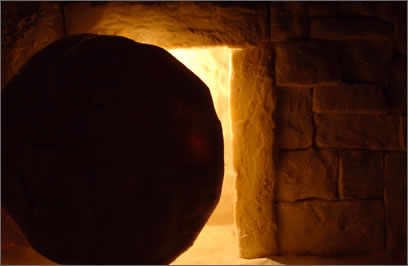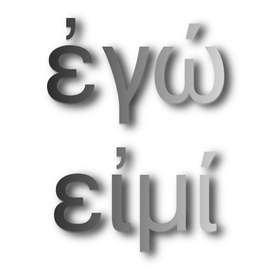|
Sometimes people begin to reject Yeshua of Nazareth because they think he’s competing with YHWH for their worship. Some believers resort to saying that Yeshua is YHWH, but I think there’s a better, more Scriptural approach.
YHWH is a jealous Mighty One (Ex. 20:5) and we should have no mighty ones before Him (Ex. 20:3), but He does commission, send, and authorize agents to work on His behalf. Prophet Moshe is a good example. He was sent directly by YHWH, and the Israelites were required to believe in him. It is written that YHWH brought the Israelites out of Egypt (Ex. 20:2), but YHWH said himself that Moshe would bring the Israelites out of Egypt (Ex. 3:12). Exodus 14:31 shows that after the Red Sea crossing, the people of Israel believed in YHWH and His servant Moshe. There was no such thing as a faithful Israelite that rejected Moshe. In Numbers 12 Moshe’s sister Miriam was struck with leprosy for speaking against Moshe. In Exodus 34:29-35 YHWH even shared some of His glory with Moshe. After Moshe spoke directly with YHWH (receiving the commandments), his face shone. From that point, whenever Moshe spoke YHWH’s words to Israel, he would speak with an uncovered face to show the power and authority of YHWH through him. The law of YHWH is even called the law of Moshe (Josh. 23:6). It was not a sin for the Israelites to revere Moshe. They did not view him as being YHWH Almighty, but they held him in high esteem as YHWH’s primary messenger and agent. He was a mighty one among the people. This helps to show how and why Yeshua is spoken so highly of later in Scripture. He too was a unique agent of YHWH (Mt. 3:15-17), upon whom YHWH placed a great amount of power and authority in (Jn. 3:34-36). We honor him as the appointed Messiah (anointed one) and Son of Elohim (Mt. 14:33), which was a title throughout the Tanach for priests and kings of Israel. The Torah even speaks of a “prophet like Moshe” rising up from among the brothers in Israel (Deut. 18:15, 18-19). YHWH places His own words in this prophet’s mouth so that a rejection of this prophet brings destruction (Acts 3:22-26). It is interesting that the author of Hebrews says Yeshua is worthy of more glory than Moshe (Heb. 3:3), as a Son over his own house (Heb. 3:6). Yeshua always loved righteousness and always hated lawlessness; this is why his Mighty One (YHWH) anointed him with the oil of gladness above his fellow brothers (Heb. 1:9). YHWH loves it when we honor His beloved Son. Don’t let anyone deceive you into rejecting Yeshua. He is worthy of glory, honor, and worship as the unique Son of Elohim. He’s the greatest man - image of the Almighty - to ever walk this earth.
0 Comments
1. In John 10:29 Yeshua says that his Father *gave* him the sheep. This proves he is not the Father. We have one person giving something to another person.
2. In John 10:29 Yeshua says his Father is greater than all. This again proves that Yeshua is not the Father. Yeshua is great, but his Father is greater. 3. The context before John 10:30, verses 25-29, show that Yeshua and the Father are ONE in keeping the sheep. Yeshua wasn't talking about being one and the same person as the Father, but one in purpose, goal, mind, etc. 4. The Greek word for one in John 10:30 is "hen." It is the neuter tense for one (eis) and means one in unity/purpose. The neuter tense never means one in number in the Greek NT. 5. When the Jews picked up stones to stone him for claiming to be God or a god (the Greek can be translated either way), whatever was in their minds doesn't prove what was in Yeshua's mind. All through the Gospel of John we see people misunderstanding Yeshua's words. We shouldn't take our lead from his accusers. We should base what we believe about Yeshua, upon what he said. 6. If people would keep reading, they would see that Yeshua attempts to answer their accusation by quoting Psalm 82:6, a scripture about lesser gods under Yahweh. In Psalm 82, Yahweh called lesser beings (some say judges; some say angels) gods or mighty ones. If Yeshua is Yahweh Elohim, why in the world does he quote Psalm 82:6 in his defense? Psalm 82 is not about Yahweh Elohim, it's about lesser elohim under Yahweh. 7. Yeshua is quoting Psalm 82:6 in John 10:34 as a scripture that cannot be broken. In Psalm 82:6, the same beings that are called "gods" are also called "sons of the most high." Yeshua was/is THE Son of the Most High (Luke 1:32). He's the most powerful elohim, second only to Yahweh. 8. If Yahweh called those beings "gods" back in Psalm 82, how is it blasphemy for Yeshua to say he is the Son of God? (John 10:36). That's Yeshua's point. The Father sanctified him and sent him into the world (this again proves he's not Yahweh the Father). Yeshua is greater than the gods of Psalm 82, but lesser than Yahweh Elohim, the Father. 9. Yeshua not only said he was the Son of God, but that the Father was in him and he in the Father (John 10:38). The Jews listening that day were only hearing with their natural ears. They weren't really concerned with his claims, so they tried to grab him again by force. 10. This passage has Yeshua saying "I am the Son of God," not that he is God. To be the Son of God immediately proves you are not the God that you are the Son of. Based upon the text in John 2:19 I have been told many times that Yeshua raised himself from the dead. I take issue with such an interpretation of John 2:19 in light of the overwhelming evidence in the New Testament which teaches that "God" (YHWH) raised Yeshua from the dead.
1. The Greek text does not literally say “I will” but simply uses the Greek word egiro, meaning basically “to raise up." The text could just as easily be translated, "Destroy this temple, and in three days it will be raised." 2. Another understanding (taking the traditional KJV rendering) is that Yeshua had a vital part in his resurrection, seeing he lived perfectly before the Father. Yeshua could guarantee his resurrection by living a sinless life. Thus he says, “I will raise it up." (Compare this to where Peter told Jews “Ye have crucified him” in Acts 5:30. The Romans were actually the ones who crucified Yeshua, but the Jews were the ones who called for or demanded his crucifixion.) 3. Yeshua died. (Mt. 27:50; Lk. 23:46). He could not literally raise himself. In Scripture, death means death; unconsciousness (Ecclesiastes 9:2-6; Psalm 6:4-5; 30:9; 88:10; Isaiah 38:18). I recently had the privilege of listening to two excellent discussions. The first was on the concept of pre-existence in the writings of second temple period Hebrews, and the second was on the nature of pre-existence in the gospel of John (particularly in regards to the person of Christ). Rather than explain it all here, I'll let Dr. Dustin Smith (dustinmartyr.wordpress.com) tell you all about it.
Here is part 1: Pre-Existence in Ancient Jewish Thought Here is part 2: The Pre-Existence of Jesus in the Gospel of John |
AuthorBlog by Matthew Janzen. Lover of Yahweh, Yeshua, my wife and 5 children. All else is commentary. Archives
December 2023
Categories
All
|


 RSS Feed
RSS Feed